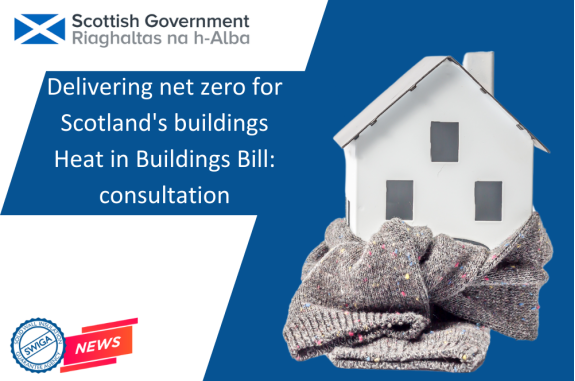SWIGA NEWS
Heat in Buildings Bill Consultation Scotland

Consultation: Important Reminder - Deadline Looming
Our friends at the Scottish Government have ased us to to remind you of a very important consultation they are running on proposals to make new laws around the energy efficiency of our homes and buildings and the way we heat those buildings. But, with the deadline for responses looming, you'll need to act without delay in order to have your say and they'd really appreciate responses from anyone with a vested interest in the Scottish retrofit market.In the words of the Scottish Minister ...
The climate crisis is the most significant challenge of the 21st century. Scotland has to be a zero-carbon country by 2045. We’ve halved our emissions since 1990, but the most challenging part of the journey lies ahead.
This is an environmental and social necessity. It is a legal obligation to which all parties in Parliament signed up in 2019. It is also a huge economic opportunity.
There are various ways in which that journey must be made: in energy supply, transport, farming and land use, and in industry. And, for the purposes of this consultation, how we heat our homes and buildings.
There are various ways in which we can reduce the greenhouse gases produced in how we heat our homes and buildings. Most obviously, better energy efficiency of homes will reduce the demand for heat. It will also reduce bills and help tackle fuel poverty.
We have detailed proposals here to build on the real progress we have made on energy efficiency and this will be especially important over the next decade. But to get to where we need to be by 2045 energy efficiency is not enough. We can’t insulate our way to net zero.
To meet our targets Scotland needs to move on from buildings heated by fossil fuels: that’s gas, oil, Liquified Petroleum Gas (LPG), coal and any other carbon-based fuel.
This is a huge challenge, and I fully understand the nature and scale of the changes that we are all being asked to make and will need to make in order to meet it - particularly at a time when people and businesses are struggling to cope in a cost of living crisis.
That cost of living crisis stems in large part from over-reliance on fossil fuels, and so the changes we will all need to make to adopt clean heating systems are necessary to reduce those cost pressures in the longer term, as well as to reduce emissions. However we are also determined to protect people from unacceptable short term costs, and to achieve our goal to reduce emissions at the same time as supporting people facing wider financial pressures.
That’s why your answers and feedback to the questions and proposals contained in this consultation are so vital. And that’s why we will be making every effort to connect with and to listen to as many people as possible – in person as well as online.
Because we are determined to make this a flexible, fair and just transition – a process which takes proper heed of the challenge facing all of us in making these changes.
That’s why we will be making sure that we provide specific flexibility and protections for specific groups and circumstances – such as those living in rural areas, for example, or on low incomes or experiencing fuel poverty.
But this consultation and our proposals are not just about a challenge to be overcome. The transition also offers opportunities for jobs, for warmer homes, and for ending our exposure to volatile fossil fuel prices, which is the source of the ongoing cost of living crisis.
There are several types of clean heating system that could get our buildings to net zero – including heat networks, heat pumps and in some cases in the future, heat from renewable hydrogen. Building owners will have choices over the path to net zero.
In this paper, then, we set out how we propose to manage the transition which we must make and which all parties agreed. But we are seeking your views on these ideas and will take account of those views before bringing legislation before Parliament to put the proposals into action.
We continue to look at examples from elsewhere in Europe, where other nations are going through the same transition, some further ahead, some still at early stages. The countries leading the way in heat pump use – Norway, Finland, Sweden and Denmark – prove that these systems will work in cold climates.
Those other European countries have a wider range of powers than we have in Scotland. We are determined to use what powers we have – on building standards, for example, or on energy efficiency – to make the progress we need to make. We will also give priority to supporting the transition within our fixed Budget.
But we have always been clear that significant powers – over funding, regulation of suppliers, pricing of gas and electricity grid capacity, among others – lie with the UK Government; for us to make as much progress as we need to means a shared ambition from the UK Government which right now appears to be in retreat.
That is why, throughout the development of these options, we have not only highlighted the areas on which we are seeking views on legislation but also that we need further clarity on the steps that the UK Government could and should take to make the transition package complete.
The proposals here are only one part of what we are doing. Separately, on areas like social housing, standards for new buildings and consumer advice we are already doing far more than ever before to make sure our homes and buildings rise to the challenge of the climate emergency. All of those areas and many more will continue to develop alongside the proposals in this paper.
We are working with banks, lenders, energy companies and others on other mechanisms that can reduce the upfront cost of investing in heat and energy efficiency by spreading that cost over a longer period.
We estimate that there are currently around 12,500 full-time equivalent jobs supported by the traditional heat and building improvement sectors in Scotland – with the possibility of more than 16,400 jobs being supported across the economy in 2030 if we can make the transition at the pace needed.
And a key message from industry is the need for certainty in order to realise that huge economic potential. That is why the proposals for regulation set out here are so important, alongside our much bigger programme of work to support the transition.
If we are to break our dependence on turbulent fossil fuel markets, increase our domestic energy security and achieve greener and more reliable ways to heat our homes and community buildings, and if we are to avoid the unacceptable increases in fuel poverty seen over the last year – this is the opportunity ahead of us.
If you have complementary or alternative proposals to get to the same place, we encourage you to tell us.
I look forward to your views.
Have Your Say
The consultation opened on the 28th November 2023 and the deadline for responses in the 8th Marcjh 2024 - so you'll need to act without delay.The full details of the consultation can be found here: Delivering net zero for Scotland's buildings - Heat in Buildings Bill: consultation >
You can respond to this consultation using the Scottish Government’s consultation hub, Citizen Space: http://consult.gov.scot.
Alternatively you can access and respond to this consultation online at: Proposals for a heat in buildings bill - Consultation.
You can save and return to your responses while the consultation is still open but please ensure that consultation responses are submitted before the closing date of 8 March 2024.
If you are unable to respond using the consultation hub, please send your response, including the completed Respondent Information Form to: HiBConsultation@gov.scot
On behalf of the Scottish Government SWIGA would like to thank you for taking the time to respond and participate.
